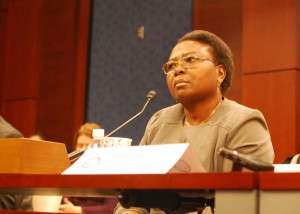
Delphine is internationally recognized for her work as a human rights lawyer and chief attorney at the Public Interest Law Center in Chad, as well as co-founding the Chadian Association for the Promotion and Defense of Human Rights. Her continuous fight to ensure the protection of human rights and the environment are exemplified by her relentless advocacy around the to the Chad-Cameroon Petroleum Development and Pipeline Project which threatened both, and will be the topic of discussion at the events this week. This plan, operated by ExxonMobil, Petronas and Chevron, launched on October 10, 2003. It was initially designed to improve the production capacity of oil fields, but has proven harmful to the environment and indigenous people. The World Bank’s decision to finance approximately 7.2 billion dollars for the pipeline project served as a catalyst for the development of the controversial proposal. However, since construction has begun, the country has fallen lower on UNDP’s Human Development Index, while more direct impacts include oil leaks and degradation of reefs destroying local fish, one of the main economic resources.
Delphine and civil society have fought to prevent the negative impacts of this project and to bring justice to those bearing those impacts of development. She began speaking out against the pipeline development in 1997, drawing particular attention to how the revenues would be utilized. She maintains that profit should benefit the people of Chad rather than to be channel for warfare and to the military. Chadian President Deby’s government has called her an “enemy of the Chadian,” people and the threats against her became so aggressive that she left her home country. Her extraordinary effort to protect human rights has not been an easy battle, but she continues to strive towards increasing standards.
Delphine has also successfully helped victims of the former dictator Hissen Habre, and has relentlessly fought to protect human rights and the environment. Her concern for Chadian access to justice has led her to create a Center for Conflict Resolution, which is still in its early stages with the goal of acting as an alternative dispute resolution mechanism for families and land disputes. Her admirable work earned her the Robert F. Kennedy Human Rights Award in 2004. Delphine previously served as a law fellow in Center for International Environmental Law’s (CIEL) Washington, D.C. office in 2000, and served on CIEL’s board of trustees from 2004 to 2013. She now focuses her efforts at the Public Interest Law Center.
Delphine will be available for comment and interview at the Commission hearing and press breakfast. We hope you will join us in our continuing coverage of #Spring4HumanRights! For those not in Washington, DC – you can view a live webcast of the hearing here.
Originally posted on April 9, 2014.
